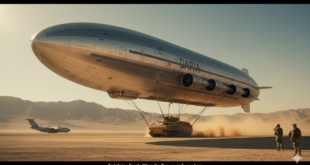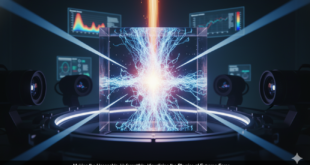The manufacturing landscape is undergoing a profound transformation as AI-driven robotics disrupt traditional processes. By integrating artificial intelligence with advanced robotics, companies like Machina Labs are driving innovation, reducing costs, and addressing critical supply chain challenges. This shift represents not only a technological leap but also a rethinking of how goods are produced and delivered.
Limitations of Traditional Manufacturing Methods
How AI-Driven Robotics Address These Challenges
AI-driven robotics are revolutionizing manufacturing by addressing the limitations of traditional methods head-on. By integrating machine learning algorithms, real-time feedback systems, and precision robotics, these technologies enable smarter, faster, and more adaptive manufacturing processes. Here’s how they are reshaping the industry:
Dynamic Tool-Free Manufacturing
AI-driven robotics eliminate the need for traditional tooling through techniques like direct material shaping and adaptive robotic manipulation. Companies such as Machina Labs exemplify this innovation by using AI-powered robots to reshape materials without specialized molds or fixtures. This approach allows for rapid prototyping and real-time design adjustments, dramatically reducing both costs and production timelines. It also enables manufacturers to experiment and iterate with unprecedented speed and flexibility, fostering innovation across various industries.
Increased Efficiency and Reduced Waste
Precision is a hallmark of AI-driven robotics, as these systems utilize advanced algorithms to optimize material usage and minimize waste. Unlike subtractive manufacturing, where excess material is discarded, AI-driven robotics often employ additive or near-net-shape techniques that ensure efficient material utilization. Additionally, real-time data analysis allows robots to predict and adjust to material behavior during manufacturing, achieving levels of accuracy and energy efficiency unattainable with conventional methods. This not only reduces operational costs but also contributes to sustainability goals.
Localized Production and Supply Chain Resilience
One of the most transformative impacts of AI-driven robotics is their ability to enable distributed manufacturing. By producing goods closer to demand centers, companies reduce their reliance on global supply chains, which are often susceptible to disruptions. Localized production shortens lead times, lowers logistics costs, and enhances the overall resilience of supply chains, ensuring continuity even during crises. This capability is particularly valuable in industries like defense and aerospace, where rapid deployment and secure production are critical.
Scalability and Adaptability
Unlike traditional manufacturing methods that struggle to balance high-volume production with the demands of customization, AI-driven robotics excel in both areas. These systems can seamlessly switch between tasks and scales, making them ideal for industries requiring diverse product mixes or rapid customization. Whether producing a single prototype or mass-manufacturing a product line, AI-driven robotics deliver unparalleled adaptability, ensuring manufacturers remain agile and competitive in a fast-evolving market.
Through these advancements, AI-driven robotics are not just improving manufacturing efficiency; they are redefining the very nature of production, making it more sustainable, flexible, and resilient. As a result, industries are better equipped to meet the demands of modern consumers while overcoming the limitations of traditional manufacturing methods.
AI-driven robotics and 3D printing
AI-driven robotics and 3D printing are reshaping manufacturing, each offering unique capabilities that address traditional limitations while driving innovation. While both technologies are transformative, they differ significantly in their principles, processes, and applications, making them complementary rather than competing solutions.
AI-driven robotics relies on artificial intelligence, machine learning, and real-time feedback to enhance traditional manufacturing. Robotic systems dynamically adapt to various tasks such as welding, assembly, and quality inspection, excelling in scalability and efficiency. Their ability to automate repetitive tasks and integrate into traditional production setups makes them ideal for mass production and highly dynamic environments. Companies like Machina Labs showcase how AI-driven robotics can revolutionize industries by reshaping materials without costly tooling, reducing waste, and improving adaptability.
In contrast, 3D printing, or additive manufacturing, builds objects layer by layer using digital designs. It eliminates the need for traditional molds and machining, enabling the creation of complex geometries and customized parts with minimal waste. However, its standalone nature and slower production speeds often limit its scalability compared to robotics. 3D printing shines in specialized applications like prototyping, manufacturing intricate engine components, and creating custom medical devices, especially where precision and low-volume production are priorities.
The synergy between these technologies is where their potential is fully realized. For instance, AI-driven robotics can automate the post-processing of 3D-printed parts or operate multiple 3D printers in an efficient production line. Together, they enable a manufacturing ecosystem that combines the adaptability and scalability of robotics with the design freedom and material efficiency of 3D printing, paving the way for a new era of innovation and sustainability in production.
Case Studies
Revolutionizing Manufacturing with AI-Driven Robotics: The Case of Machina Labs
Manufacturing industries, particularly aerospace, defense, and automotive, have long grappled with high costs and complex supply chains. Traditional methods often demand expensive tooling and prolonged production cycles, which become even more challenging when quick replacements or design adjustments are necessary. Machina Labs, a trailblazing startup, is addressing these pain points with a revolutionary AI-driven robotic manufacturing technology. Their approach not only slashes costs but also brings production closer to where it is needed, transforming supply chains and enabling faster responses to critical demands.
Machina Labs employs robotic sheet forming, a process where AI-powered robots shape and form metal into intricate structures without requiring molds or dies. This innovation integrates machine learning and advanced robotics to adapt in real time to design changes, enabling rapid prototyping and production. Unlike conventional manufacturing, which involves extensive retooling for new components, Machina Labs’ systems allow for cost-effective, flexible, and waste-minimizing production cycles. These advancements reduce development timelines from months to mere days, creating significant efficiency gains across industries.
One of the most impactful applications of this technology is in defense and aerospace, where supply chain agility is paramount. Traditionally, replacement parts for mission-critical systems are manufactured at centralized facilities, resulting in long lead times for delivery to remote or frontline locations. Machina Labs’ technology enables decentralized production, allowing components to be fabricated closer to the point of need. This capability can be transformative for military operations, minimizing downtime and enhancing the resilience of critical systems in the face of disruptions.
The broader implications of Machina Labs’ innovations signal a shift toward more agile and decentralized manufacturing. By eliminating traditional bottlenecks, the company is paving the way for just-in-time production models and enabling operations in austere or remote environments. As this technology continues to mature, its potential to redefine manufacturing processes across industries becomes increasingly clear. Whether addressing logistical challenges on the battlefield or creating cost efficiencies on the factory floor, Machina Labs exemplifies how AI-driven robotics are ushering in a smarter, faster, and more adaptable era of manufacturing.
Machina Labs exemplifies the transformative potential of AI-driven robotics in modern manufacturing. By utilizing robotic arms controlled by advanced machine learning algorithms, the company can reshape sheet metal into intricate forms without relying on costly tooling. This breakthrough enables cost-effective and flexible production of aerospace components, automotive parts, and defense equipment, showcasing how AI-driven robotics can streamline traditionally rigid manufacturing processes.
Other companies are also leading the charge in redefining manufacturing through AI-powered robotics:
- Bright Machines: Focused on robotic automation for electronics assembly, Bright Machines leverages AI to enhance speed and accuracy. Their systems optimize assembly lines by adapting to dynamic production requirements, making electronics manufacturing faster, more efficient, and highly scalable.
- Path Robotics: This company specializes in AI-driven robotic systems for welding tasks. Their technology can adapt in real time to variations in material types, shapes, and designs, ensuring precision and consistency in an area where traditional methods often falter due to irregularities.
- Carbon: Combining AI with 3D printing, Carbon creates high-performance polymer parts. Their approach demonstrates how additive manufacturing and robotics can work in tandem to produce complex, lightweight, and durable components, expanding possibilities for applications in industries like healthcare, automotive, and sports equipment.
These companies highlight the diverse applications of AI-driven robotics, from reshaping metals and automating assembly lines to performing specialized tasks like welding and additive manufacturing. By integrating AI into robotic systems, they are addressing key challenges in traditional manufacturing, including cost, efficiency, and adaptability, and driving innovation across a wide array of industries.
Challenges and Future Directions
While AI-driven robotics offer immense promise, they are not without challenges. High upfront costs for advanced robotic systems and AI integration can deter smaller manufacturers. Additionally, the reliance on skilled personnel to program and maintain these systems highlights the need for workforce upskilling.
Looking ahead, advances in AI algorithms, sensor technologies, and robotics hardware will continue to reduce costs and improve performance. As these technologies become more accessible, they are set to redefine the manufacturing landscape, empowering companies to innovate faster, reduce costs, and build more resilient supply chains.
Conclusion
AI-driven robotics represent a paradigm shift in manufacturing, addressing the limitations of traditional methods while unlocking new possibilities. By enabling dynamic, efficient, and localized production, these technologies are transforming supply chains and driving the future of industry. As companies like Machina Labs and others lead the way, the age of intelligent manufacturing is here—and its potential is only beginning to unfold.
 International Defense Security & Technology Your trusted Source for News, Research and Analysis
International Defense Security & Technology Your trusted Source for News, Research and Analysis




